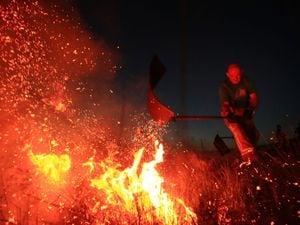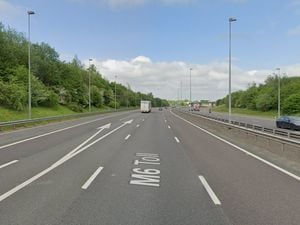Farmers count the costs of fires in hot summer
Devastating fires cost Midlands farmers more than £1.7 million during the long hot summer.

The National Farmers' Union (NFU) revealed claims shot up during the long dry spell, when there were several large wildfires in the region.
Farmers suffered as the hot weather sparked costly fires.
The NFU said national claims for fires rose by 21 per cent to £35m compared to 2017.
Firefighters have been run ragged last summer with a huge rise in deliberate fires compared to last summer.
Crews across Staffordshire attended 1,475 grass and rubbish fires during June, July and August – 1,115 of which were believed to have been started deliberately.
This is compared to just 495 of these fires reported in 2017, of which 388 were deliberate.
Between June 1 and August 31 last year, the amount of deliberate rubbish and grass fires tripled to 58 in Stafford from the same time last year when there were 18 recorded.
The Cannock Chase district saw 59, rising from 35, while there were 92 in South Staffordshire, up from 40 and 31 in Lichfield up from 24.

Among the areas hit were Hednesford Hills where a grass fire destroyed 12 acres of countryside in July.
Tim Price, NFU Mutual rural affairs specialist, said: "Fire remains one of the greatest hazards on the nation’s farms.
"We normally see claims peaking in August and September, but this year saw a sharp increase in claims during June and July.
"This was due to the exceptionally hot dry summer which brought harvesting forward by almost a month and resulted in tinder dry crops and overheating of combines, balers, and other harvesting machinery.”
The most common cause of farm fires during the 2018 harvest period – responsible for almost half of NFU mutual’s claims - were electrical and mechanical fires, many of which started in vehicles such as balers, combine harvesters and tractors due to the scorching weather providing the perfect environment for overheating.
The second most common cause of fire was spread from elsewhere – such as a barn or homestead, followed in third place by arson.
Mr Price said: “The scale of these claims shows how important it is to take all possible steps to prevent fires breaking out, and to have clear plans to evacuate people and livestock safely in the event of a fire.
"Also, it’s vital to make sure you have the right sort of fire extinguishers maintained in good order so you can fight small fires safely.”





